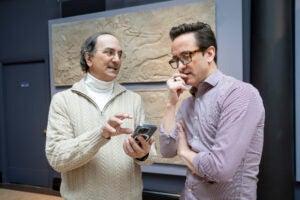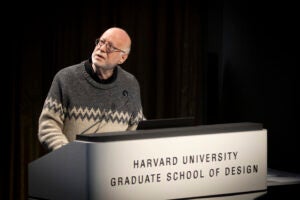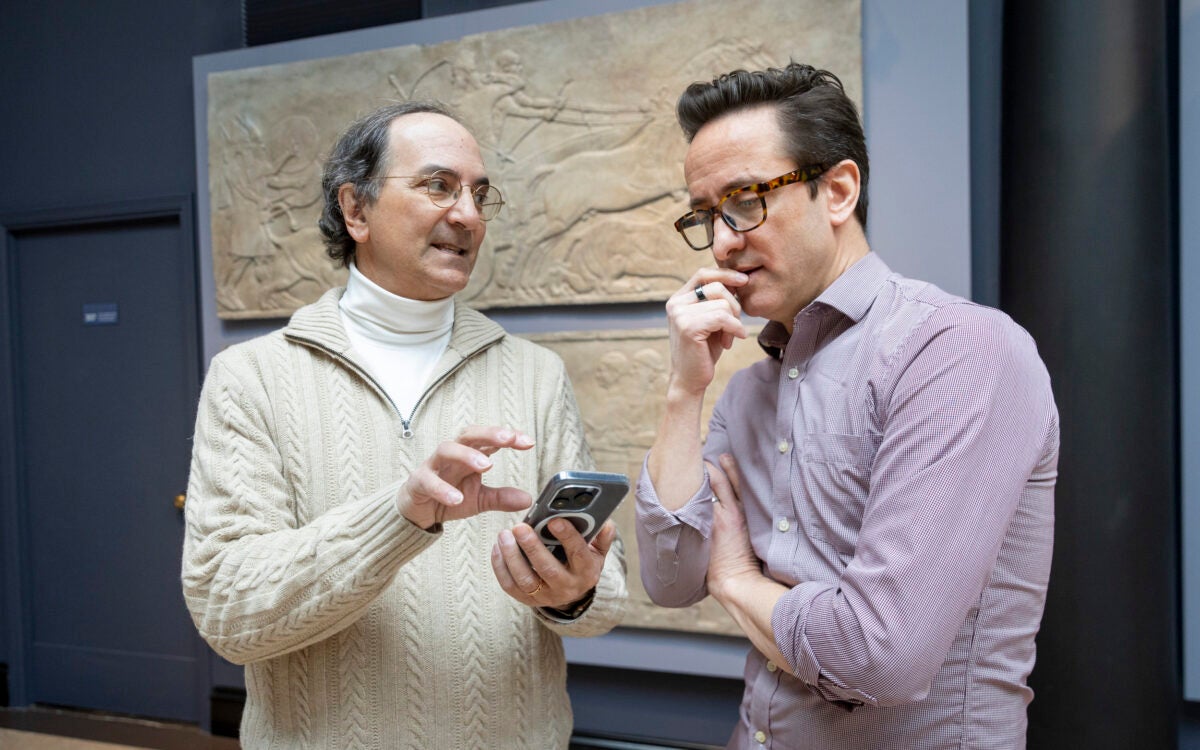Poetry, music, death take the stage at New College Theatre
Bearing the bandages, water and sponge,
Straight and swift to my wounded I go,
Where they lie on the ground after the battle brought in,
Where their priceless blood reddens the grass, the ground …
So opens the middle section of Walt Whitman’s poem about the American Civil War, “The Wound-Dresser.” The dramatic stanza also begins contemporary classical composer John Adams’ musical work of the same name, written in 1989 for baritone voice and orchestra.
Adams ’69, A.M. ’72 returned to Harvard on Nov. 17, where he attended a performance of his piece by Harvard’s Bach Society Orchestra (a group he led in the 1960s) at the New College Theatre. The concert was followed by a discussion that touched on music, poetry, and the inescapable desperation and death that characterized the United States’ bloodiest conflict. The event was sponsored by the Office for the Arts at Harvard (OfA).
The composition’s melody is as haunting as its text. In the opening measures, the strings carry a pulsing beat, adding, with their high register, an increased sense of tension. Later, a ghostly trumpet sounds, reminiscent of horns on battlefields. And throughout, a voice recites in song the grim text of Whitman’s poem, recounting the brutality and despair of his work as a volunteer nurse during the Civil War.
The provocative combination of poetry, music, literary criticism, and history was far from accidental. As Thomas Lee of OfA said, “One of our goals for this event was to create an exploration of Walt Whitman in the contexts of literature, music and history (as well as art-making and performance), a multiple cross-disciplinary convening that we seldom see at Harvard. Conceptually, this is something we often strive for in our programming, a mission that is the Office for the Arts’ unique contribution to the Harvard environment.”
Harvard President Drew Faust and Helen Vendler, A. Kingsley Porter University Professor in the Department of English and Literature, joined Adams onstage, adding their learned perspectives to the conversation. Vendler, who has written many books on poets and poetry, is widely regarded as one of the nation’s foremost poetry critics. Faust is a leading Civil War historian. Her recent book, “This Republic of Suffering: Death and the American Civil War” (Knopf, 2008), examines the culture of death that accompanied the war and the ways in which society came to terms with the massive loss of life.
Many factors influenced Adams’ choice of “The Wound-Dresser” as a work to set to music.
He writes in his autobiography, “Hallelujah Junction: Composing an American Life” (Farrar, Straus and Giroux, 2008), that he initially planned to set to music the sections of Whitman’s prose work “Specimen Days” that recounted the author’s Civil War experience. The book included moving pictures of wounded soldiers in field hospitals, which reminded Adams of his personal connection to the loss of friends who had succumbed to AIDS. In addition, he said, he was put in mind of his mother caring for his father who died after a long, heartbreaking struggle with Alzheimer’s.
“I was very conscious of this very quiet drama that plays out everywhere in the world at all moments; but it’s just not a very romantic drama. … It can be very ugly and so sad that we don’t want to think about it,” he told the crowd on Monday.
The notion of loss and caregiving — and the idea of celebrating the caregiver — Adams said, were all present when he chose to orchestrate Whitman’s poem “The Wound-Dresser.”
To open the discussion, Faust asked the composer to expand on his attraction to the poet’s work.
Whitman, said Adams, appealed to his own love of the “American utterance, the American experience,” and the flow of the American language.
“He was such a shockingly new voice. I mean life was rough, life was crude in America in the 1850s, but literature was rather polite. And when you think about the way Whitman expresses his eroticism, his homosexuality, his incredible vision of the land, the people, this democratic image … it’s just a profoundly evocative and meaningful thing to me.”
Throughout his career Adams has incorporated historic events into his work. His opera “Nixon in China,” from the 1980s, recounts the former president’s famous visit, and his 2005 opera “Doctor Atomic” chronicles the lead-up to the first atomic bomb test in Los Alamos, N.M. In 2003, Adams’ choral work “On the Transmigration of Souls,” in honor of the victims of September 11, won the Pulitzer Prize for music.
During the discussion, Vendler wanted to know why Adams had chosen to stop the voice at particularly dramatic moments in the text to yield to the music.
“I wondered if you’d say something about when you decided to interrupt Whitman,” she said to a wave of chuckles from the crowd.
“A lot of composing has to do with the sense of balance,” he replied. “You have an idea, you have a text, you want to say something, and you then need to actually put in the time for reflection. So it’s very much an issue of just knowing how long to go.”
English is tricky to work with, said Adams, responding to a query from the audience about the challenges of the language. To laughs, he noted that the line from his opera “Doctor Atomic” — “We are bedeviled by faulty detonators” — wasn’t quite as melodic as some Italian opera lines.
Whitman’s “The Wound-Dresser” may have not been the ideal poetry to set to song, admitted the composer. But despite the difficulties of the language, Adams said, he found the poem’s profound emotional pull irresistible.




